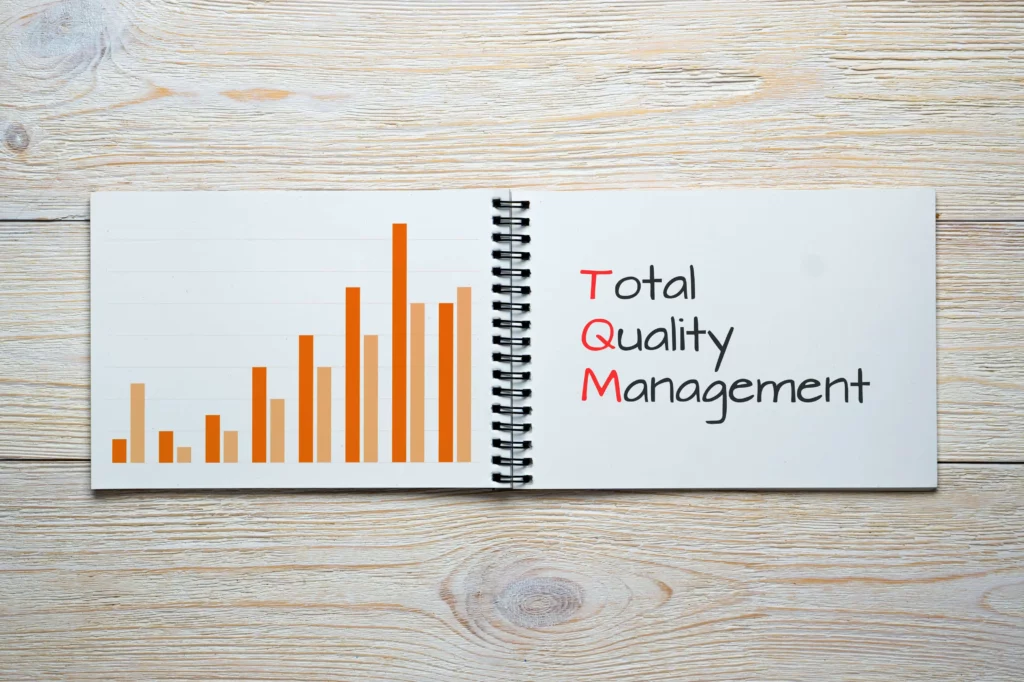Imagine standing on a bustling factory floor, amidst the symphony of machines crafting precision vehicles. This article is your ultimate guide to understanding and implementing Total Quality Management (TQM) in such an environment – the automotive industry. Through this comprehensive guide, we’ll navigate the complexities of TQM, explore its significance, address implementation challenges, and delve into real-world case studies. Take the driver’s seat and steer your organization towards unparalleled quality and efficiency.
Understanding Total Quality Management
‘Understanding Total Quality Management’ begins with grasping three fundamental principles that guide its implementation in the automotive industry. Now, don’t get your carburetor in a twist; we’ll break this down in a jiffy.
First, TQM is like that fussy car enthusiast uncle of yours who insists that every single nut and bolt must be perfect. It’s all about focusing on quality at every stage of production, not just at the end.
Second, TQM is a team sport, not a solo race. Everyone from the CEO to the factory floor worker has a role to play. Think of it like a pit crew in a race, where every member has a vital role in ensuring the car performs at its best.
Lastly, ‘Continuous Improvement’ is the turbocharger of TQM. It’s about relentlessly pursuing better ways to do things, constantly fine-tuning processes, and never resting on your laurels. Because in the race of quality, there’s no finish line.
So, for those control enthusiasts out there, TQM is your golden ticket. It provides you with a framework to steer the quality of your automotive products in the direction you want. It’s like having the steering wheel, the accelerator, and the brake pedal all at once.

Importance of TQM in Automotive Industry
The significance of TQM in the automotive industry cannot be overstated, particularly considering the intricate and interconnected nature of automotive production processes. Think of it like a wildly complex dance routine – one wrong step, and you’ve got a cascading domino effect of mishaps. But instead of a bruised ego, we’re talking about a million-dollar mistake. That’s where Total Quality Management (TQM) steps in, almost like a skilled dance instructor, ensuring everyone is toe-tapping in unison.
TQM Benefits are as clear as a newly polished windshield. When effectively implemented, TQM minimizes errors, boosts productivity, and improves overall quality. It’s like having an invisible, omnipresent quality inspector, ensuring your production line is working as efficiently as a well-oiled engine.
Quality Innovation, another TQM perk, is essentially the turbocharger of the automotive industry. It propels organizations to constantly improve processes, products, and services, leading to higher customer satisfaction. Picture this, a car that adjusts the seat, mirrors, and even the radio station based on the driver. Sounds like something from a sci-fi movie, right? Well, thanks to TQM and its focus on Quality Innovation, such advancements are not just possible, but probable.
Implementing TQM in Automotive Production
Embarking on the journey of implementing Total Quality Management (TQM) in automotive production requires a firm commitment to systematic planning and focused execution. It’s a bit like learning to drive a stick-shift; you have to get the gears of your organization to seamlessly mesh together.
First up, TQM Training Programs. These are not your typical, snooze-worthy training sessions. Picture instead a vigorous workout for your employees’ quality management muscles. Training sessions should be engaging, direct, and focused on the unique needs of the automotive industry. These programs ensure your team understands concepts like continuous improvement, customer focus, and error prevention. It’s like a boot camp for automotive quality excellence, minus the drill sergeant shouting in your face.
Next, we need to talk about Supplier Involvement. Forget about the old school “us vs. them” mentality. In the world of TQM, suppliers aren’t just vendors; they’re partners. You need to involve them in your quality management process as if they were part of your team. Why? Because in a sense, they are. Their materials, their delivery times, their prices – all affect the quality of your end products. So, open up those communication lines, invite them to your TQM training sessions, make them feel like part of the family. But remember, no awkward family reunions, please!
Implementing TQM in automotive production may seem daunting, but remember, every great journey begins with a single step. So, buckle up, rev up your TQM engines, and let’s drive towards a future of automotive excellence.

Case Studies of TQM in Auto Manufacturing
Transitioning from theory to practice, let’s explore some real-world case studies of TQM in auto manufacturing that illuminate the concrete benefits and challenges of this quality management approach.
- Quality Control Failures: The first case is a classic tale of what not to do. Company X, a well-known car manufacturer, decided to skip a few steps in its quality control process. The result? A recall of over 500,000 cars due to a faulty brake system. The lesson? Cutting corners can be costly in the long run, not just financially but also in reputation damage.
- Supplier Integration Success: On a brighter note, let’s look at Company Y. They adopted a TQM approach that emphasized integration with their suppliers. By doing so, they were able to streamline their production process, reduce waste, and improve overall product quality. The result? A 20% increase in sales and a surge in customer satisfaction.
- Balancing Act: Lastly, we have Company Z. They successfully implemented TQM but struggled with maintaining a balance between cost control and quality assurance. Through trial and error, they found their sweet spot, demonstrating that implementing TQM is less about perfection and more about constant learning and adaptation.
Whether it’s learning from failures or celebrating successes, these case studies serve as practical lessons for those looking to implement TQM in auto manufacturing. Now that we’ve highlighted these examples, let’s shift gears and explore how to overcome challenges in TQM implementation.
Overcoming Challenges in TQM Implementation
Implementing Total Quality Management in the automotive industry presents a number of challenges that require strategic planning and thoughtful solutions for successful integration. It’s a bit like adding a turbocharger to your old faithful car – it’s bound to shake up a few things!
One of the big speed bumps on this road to quality is ‘Employee Resistance’. Let’s face it: people can be as stubborn as a rusty nut in an old engine. It’s human nature to resist change, particularly when it’s perceived as more work or a threat to job security. To overcome this, communication is key. Explain the benefits of TQM, not just for the company, but for the employees too. Show them how it can drive their careers forward faster than a sports car on an open road.
Then, there’s the challenge of ‘Organizational Culture’. Changing the culture of a company is like trying to change the color of your car with a single spray can. It’s not going to happen overnight. It requires patience, persistence and a clear vision. Leaders need to model the behavior they want to see, rewarding those who embrace the TQM principles.
In essence, overcoming these challenges is about getting your team on board and driving in the right direction. It’s about creating a culture where quality is not just a checkbox, but the fuel that drives every decision. So buckle up, because implementing TQM is a journey, not a destination. But with the right attitude and a clear roadmap, you’ll be cruising down the highway of success in no time.
Conclusion
In conclusion, Total Quality Management (TQM) is an integral cog in the machine that is the automotive industry. Its successful adoption can drive efficiency, improve quality and steer the industry towards a more sustainable future. Much like a well-oiled engine, TQM ensures that all parts of a manufacturing process work together smoothly. It’s not a quick fix, but a long-term commitment that, when executed properly, can take the automotive industry to new, unprecedented heights.




